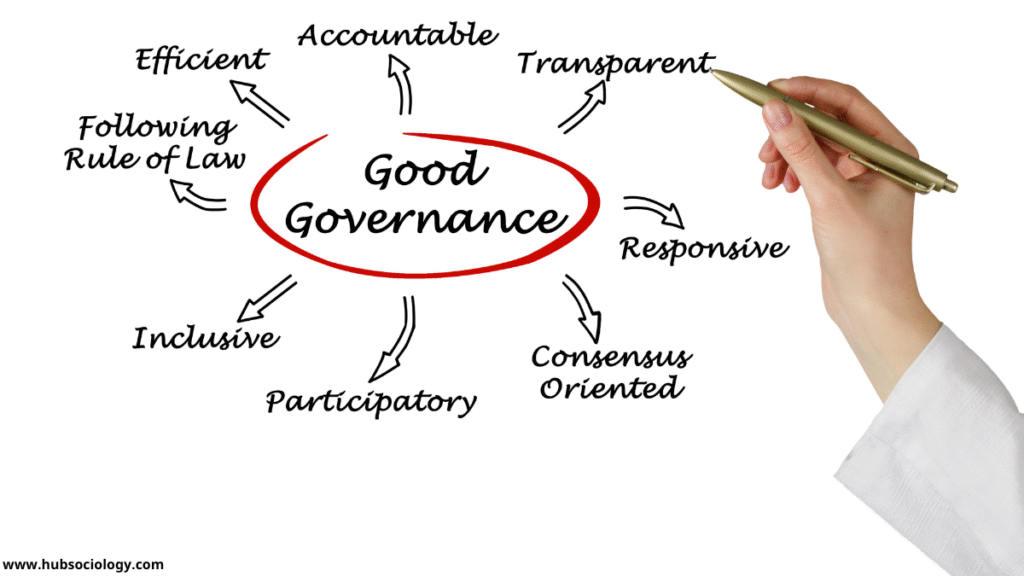Introduction on ICT and State
The rise of Information and Communication Technology (ICT) has deeply transformed the structure and functioning of the modern state. Traditionally, the state was viewed as the supreme authority exercising sovereignty over a defined territory and people, with institutions like legislature, executive, judiciary, and bureaucracy shaping its functions. However, with ICT as a transformative force, the state’s mechanisms of governance, legitimacy, surveillance, and citizen participation have undergone radical change. From e-governance to digital surveillance, from social media politics to global cyber diplomacy, ICT has become a crucial element in the sociological study of the state.
This article explores the relationship between ICT and state from a sociological perspective, highlighting how digital technologies reshape power relations, state–society interactions, and governance models.

Table of Contents
Theoretical Perspective: ICT and State
In sociology, the state is not only a political organization but also a social institution that organizes collective life, enforces laws, ensures order, and mediates between competing social interests. Classical theorists such as Max Weber defined the state as the legitimate holder of monopoly over violence, while Marx saw the state as an instrument of class domination. In the 21st century, ICT reconfigures these classical theories by introducing new dimensions of legitimacy, authority, and control.
- Weberian Perspective: Legitimacy today partly derives from efficiency and transparency, which ICT can enhance through e-governance systems, online portals, and digital accountability mechanisms.
- Marxian Perspective: ICT is also seen as a tool that the ruling class uses to maintain hegemony through media control, digital propaganda, and surveillance of dissent. However, it simultaneously provides platforms for resistance, such as social movements using social media.
- Postmodern Perspective: Scholars argue that ICT has fragmented the authority of the nation-state, producing a network society where power is distributed among global corporations, international organizations, and digital communities, often beyond the control of traditional state institutions.
ICT and State Functions
ICT has become central to the performance of state functions. From policymaking to service delivery, technology mediates the relationship between rulers and the ruled.
1. Governance and Administration
E-governance initiatives allow citizens to access services such as tax payment, land registration, and welfare schemes online. This reduces bureaucratic delay and corruption while enhancing state legitimacy. For example, India’s Digital India mission has transformed state-citizen interactions through Aadhaar, UPI payments, and online grievance redressal systems.
2. Law, Order, and Surveillance
The state employs ICT for maintaining law and order through digital databases, CCTV networks, biometric identification, and predictive policing tools. This increases the efficiency of crime control but also raises concerns about the surveillance state, privacy, and potential misuse of power.
3. Security and Defense
Cybersecurity has become integral to state sovereignty. States now invest heavily in cyber defense against hacking, espionage, and misinformation campaigns. Warfare itself has expanded to digital domains, making ICT a weapon as well as a shield.
4. Welfare and Development
ICT allows the state to implement welfare schemes efficiently through direct benefit transfer (DBT), digital health records, and online education platforms. This enhances inclusion, though the digital divide still excludes marginalized communities.
ICT, State and Democracy
One of the most significant sociological implications of ICT is its impact on democracy and political participation.

- Digital Democracy: Citizens can now engage with political debates through social media, online petitions, and digital campaigns. ICT increases participation and accountability by making governance more transparent.
- Elections and Political Campaigns: Electoral politics has been revolutionized by ICT through electronic voting machines (EVMs), online voter registration, and digital campaigning. Social media platforms often determine political narratives, influencing electoral outcomes.
- Public Sphere: Following Jürgen Habermas’s concept of the public sphere, ICT has created a digital space where citizens debate, discuss, and form opinions. However, it is also prone to misinformation, echo chambers, and polarization, raising challenges to rational democratic discourse.
- Populism and Propaganda: ICT has empowered leaders to connect directly with citizens, bypassing traditional media. While this deepens political engagement, it also facilitates populist propaganda, fake news, and manipulation of public opinion through algorithms and data analytics.
ICT, State and Globalization
ICT not only transforms the internal functioning of the state but also reshapes its position in the global order.
- E-Diplomacy: States now practice digital diplomacy through official social media handles, real-time negotiations, and cyber agreements.
- Global Governance: Issues like internet regulation, data privacy, and cyber warfare require states to collaborate beyond borders, weakening the notion of absolute sovereignty.
- Dependency and Inequality: Technological infrastructure is dominated by global corporations (Google, Meta, Amazon), making states dependent on transnational actors. This raises questions of sovereignty in the digital age.
ICT, State and Social Control
Sociologically, the state uses ICT both as a tool of empowerment and as an instrument of control.
- Surveillance Society: Michel Foucault’s theory of disciplinary power applies strongly in the digital age. CCTV, biometrics, facial recognition, and digital monitoring create a “panopticon” where citizens feel constantly observed.
- Data as Power: States collect massive amounts of data on citizens through ICT. This “datafication” of society allows better policy planning but also concentrates power in the hands of the state.
- Censorship and Regulation: Many states regulate online content, block websites, or restrict digital communication during protests or unrest. This shows the tension between ICT as a liberating force and ICT as a tool of authoritarianism.
Challenges of ICT for State
Despite its advantages, ICT introduces several sociological challenges for the state:
- Digital Divide: Inequalities in access to ICT reproduce social inequality. Rural, poor, and marginalized groups often remain excluded, weakening the state’s promise of equality.
- Cyber Threats: States face constant threats from hackers, cybercriminals, and rival states. This creates insecurity and demands heavy investments in cyber infrastructure.
- Privacy Concerns: Surveillance raises ethical concerns about individual freedom, data protection, and the balance between security and liberty.
- Misinformation and Polarization: ICT enables the rapid spread of fake news, hate speech, and conspiracy theories, which challenge state legitimacy and social cohesion.
Sociological Implications on ICT and State
The relationship between ICT and the state reveals deeper sociological processes:
- Transformation of Authority: Authority is no longer confined to formal state institutions; digital corporations and online communities also shape social order.
- Changing Citizenship: Citizenship now includes digital rights such as data privacy, internet access, and freedom of expression online.
- Network Society: As Manuel Castells argues, the state is embedded in a global “network society,” where power flows through digital networks rather than fixed institutions.
- Negotiation of Power: ICT creates new arenas for both domination and resistance. While the state strengthens surveillance and control, citizens use ICT for activism, protests, and demands for accountability.
Conclusion on ICT and State
ICT has fundamentally altered the sociological understanding of the state. It is no longer sufficient to analyze the state only in terms of territory, sovereignty, and institutions; one must also consider digital infrastructures, cyber policies, and online interactions. ICT enhances state capacity in governance, welfare, and security, but also raises new challenges of inequality, surveillance, and legitimacy.

From a sociological lens, ICT and the state reflect a dialectical relationship: while ICT empowers the state to perform its functions more efficiently, it also fragments authority, globalizes governance, and empowers citizens to question, challenge, and reshape state power. The future of the state will therefore be deeply intertwined with how societies manage the opportunities and risks of the digital age.
Do you like this this Article ? You Can follow as on :-
Facebook – https://www.facebook.com/hubsociology
Whatsapp Channel – https://whatsapp.com/channel/0029Vb6D8vGKWEKpJpu5QP0O
Gmail – hubsociology@gmail.com
Topic-related exam questions on ICT and State
5 Marks Questions on ICT and State (Short Answer)
- Define the role of ICT in modern state governance.
- What is meant by the “surveillance state” in the context of ICT?
- Mention two ways ICT has transformed democracy.
- Write a short note on e-governance.
- How does ICT challenge state sovereignty in globalization?
10 Marks Questions on ICT and State (Medium Answer)
- Discuss the Weberian and Marxian perspectives on ICT and the state.
- Explain how ICT has transformed state functions such as law, order, and welfare delivery.
- What are the major challenges ICT poses to the state in terms of inequality and security?
- Describe the role of ICT in shaping the public sphere and democratic participation.
- Examine the relationship between ICT, surveillance, and social control with reference to Foucault.
15 Marks Questions on ICT and State (Long Answer)
- Critically analyze how ICT reshapes the nature and functions of the state from a sociological perspective.
- Discuss the impact of ICT on democracy, politics, and citizen participation. Provide suitable examples.
- “ICT strengthens the state’s capacity but also fragments its authority.” Discuss this statement with reference to globalization and network society.
- Evaluate the opportunities and risks of ICT in state governance with sociological theories.
- Explain the dialectical relationship between ICT and the state, highlighting both its empowering and controlling aspects.
